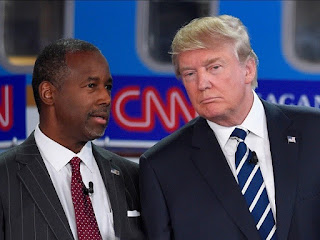Could there be two more stylistically
disparate presidential candidates on the same side of the political aisle (at
least nominally) than soft-spoken surgeon Ben Carson and swaggering showman
Donald Trump? When asked recently what sets him apart from his rival, Carson
cited a personal favorite verse from his daily reading of Proverbs: “A man’s
pride brings him low, but a man of lowly spirit gains honor.” Admirable
sentiment, but in a media-driven culture that encourages cults of personality,
is it even possible today for “a man of lowly spirit” to become President?
The
Federalist recently posted a
reverential profile of Carson
and declared that his faith, humility, and quiet strength trump Trump’s
arrogance. In that article, again in response to how he differs from Trump, Carson
quoted another verse from Proverbs: “‘By humility and the fear of the Lord are
riches and honor and life,’ and that’s a very big part of who I am. I don’t get
that impression with [Trump]. Maybe I’m wrong, but I don’t get that.”
He’s not wrong. Whatever you may think of Trump
– and he provokes extreme opinions – humility is not a quality that leaps to
mind, and that’s just fine with his fans. To them he radiates a winning confidence
that, falsely or not, suggests power, while Carson’s reserved demeanor, falsely
or not, suggests deference, and Americans don’t want a deferential leader.
After two terms of a President often criticized for his “apology tours,”
Americans are looking forward to a leader who will kick ass and take names.
The Federalist asserted that Carson’s humility is “not
weakness, but a strength that is sorely lacking in our world today.” That
echoes the theme of a 2013 book I reviewed for The New Criterion
titled Humility: An Unlikely Biography of
America’s Greatest Virtue, by David J. Bobb, who believes not
only that “‘American humility’ is
not an oxymoron,” but that it is actually our country’s greatest virtue. He
argues that as a nation today we have lost touch with both our humility and our
greatness, and that we suffer from a toxicity of arrogance that hinders a
revival of that greatness.
We tend to admire humility in our Founding
Fathers, especially George Washington, who happens to be one of Bobb’s examples
of Americans who prove that “humility and magnanimity can coexist in the same
soul.” When Washington was
offered the opportunity to be crowned king in the early days of our fledgling
Republic, he humbly and wisely rejected the temptation. I can envision Ben
Carson doing the same, but Donald Trump? Hard to picture him turning down a
shot at king, and that’s a dangerous arrogance, the kind that brings emperors
and their empires down.
In fact, Bobb warns in his book that “our
fame-addled and power-hungry” culture, in which arrogance is rewarded and
humility ignored, is beginning to mirror Rome’s just before its fall. We are
desperately in need, Bobb writes, of political and cultural leaders who
manifest St. Thomas Aquinas’ notion of a balance of magnanimity and humility.
St. Augustine of Hippo
once wrote of “the power and excellence of humility, an excellence which makes
it soar above all the summits of this world, which sway in their temporal
instability, overtopping them all with an eminence not arrogated by human pride,
but granted by divine grace.” But the 5th century Augustine was not
writing for an audience immersed in a culture whose media shove aside the
humble to praise the arrogant. Today, self-promoting gets you noticed; self-effacing gets you erased from the
picture altogether. Trump knows this full well; he talks as much about the ratings he
brings to the presidential race as he does the ideas and solutions he has to
offer the country.
Despite their polar opposite characters, the
two political outsiders Trump and Carson hold wide polling leads over the rest of the crowded field of
Republican hopefuls, suggesting that many Americans do greatly respect Carson’s
quiet strength of character; at the same time others can’t help being drawn to
Trump’s unapologetic, bull-in-a-china-shop cockiness. Indeed, Trump’s lead over
Carson is almost as great as Carson’s lead over the next most popular
candidate. As things stand now, he would defeat Carson handily.
Americans have to get past the hype and think
about the character of the person we want to be our next President. We need a leader
with the right balance of humility
and strength, charisma and gravitas,
especially in this age of the pop culture Presidency. We need a leader who, like Washington and Abraham
Lincoln, is wary of the unchecked ambition that could lead to the creation of
an American tyrant. We need a leader who takes a healthy pride – not arrogance – in our exceptionalism, and who recognizes
there is wisdom in humility. What we don’t need is yet another presidential
cult of personality.
From Acculturated, 9/18/15



